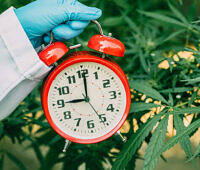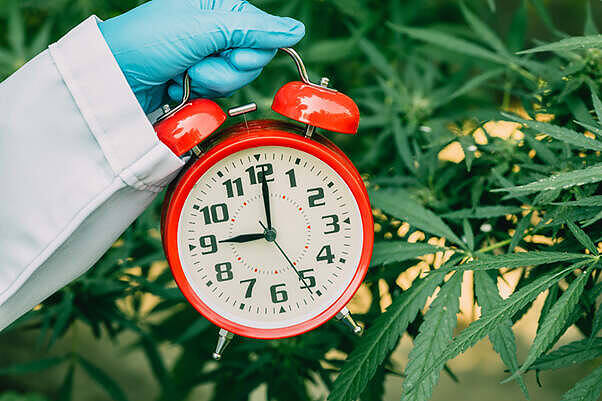
How Long Does Weed (Cannabis) Stay In Your System?

The length of time that cannabis stays in your system varies and is dependent on personal use and other influencing factors.
Generally, the longer you have smoked pot and the higher the frequency and stronger the strain, the longer it will remain in your system.
Whilst all strains of weed/cannabis are highly detectable, unlike alcohol, specific intoxication levels cannot be measured in your body.
Tests for detecting cannabis in your system include blood, saliva, hair strand and urine dip tests.
The timeline for detecting marijuana is vast and can vary from 1 day up to 90 days or more post-consumption (1). In this article, we will look at the various trusted testing methods and how long each test can detect this popular drug. Additionally, we will explain the factors that affect how long cannabis stays in your system.
Cannabis drug testing & the law
Cannabis is a Class B controlled drug under Part II, Schedule 2, of the Misuse of Drugs Act 1971.
In the UK, it is illegal to possess, supply, produce, import or export any strain of cannabis except under a Home Office licence. It is also unlawful to grow any marijuana plant unless a Home Office licence is obtained.
Drug testing for cannabis is common in areas of occupation, law enforcement, medicine and sport. A positive drug test for cannabis confirms that you have cannabis in your system. However, whilst tests cannot determine your levels of intoxication, it does help to identify recent or heavy use according to the THC (delta-9-tetrahydrocannabinol) levels measured (2)
According to the Substance Abuse and Mental Health Services Administration (SAMHSA), roughly 1 in 10 people who use cannabis will become addicted to it. These rates increase to 1 in 6 if a person starts using it before the age of 18 (3) |
Cannabis detection window
Many variables affect how long weed stays in your system and is therefore detectable through various drug testing methods.
Variables that affect cannabis detection times include
- The amount of pot used
- Strength of cannabis
- The frequency of use
- Type of drug test
- Duration of use (acute or chronic)
- Metabolic rate
- Body fat percentage
- Hydration levels
- Route of administration (i.e., smoking weed or consuming cannabis edibles)
A person who uses weed daily and has done so for a long time will have a much longer time frame of detection than a person who partakes in the occasional joint.
There are variables that have an impact on cannabis detection times, but the main factors are: a) how much cannabis you use and b) the frequency with which you use it.
To demonstrate this, most drugs are detectable in urine for only 2-3 days after use. However, In a chronic, daily pot user, cannabis can be detected in urine for up to 4 weeks (4)

How long does (Weed) Cannabis stay in your system? Urine, Blood, Saliva & Hair
Testing methods used for detecting cannabis in your system are urine analysis, blood test, saliva and hair sample.
Hair strand tests for cannabis can be used to test a sample of hair from anywhere on your body. This test provides the longest time frame for detection. However, hair sample testing is not an accurate representation of recent cannabis use. It is also a costly and lengthy process.
The most commonly used methods of testing for cannabis in a community or rehab setting are urine analysis and saliva. These tests are simple to perform and provide rapid results.
Cannabis (weed) drug testing methods each have different time frames for detecting the drug. So it is important to be aware that the type of test used could influence the outcome of your test results.
How long Cannabis stays in your urinary system
Cannabis urine testing is the most accurate method of testing for recent cannabis use. Urine tests are designed to detect THC (delta-9-tetrahydrocannabinol), which is the psychoactive ingredient in cannabis. Urine tests can also detect other marijuana metabolites and are considered to be quite accurate.
A urine screen test kit for cannabis will require you to provide a urine sample for analysis. This is usually done within a controlled environment to ensure that the sample provided belongs to you. A healthcare provider will provide you with a sample pot and may stand outside an enclosed toilet cubical whilst you provide the sample.
The THC component of cannabis can stay in your system for an average of up to 10 days in a casual pot user. In a person who uses pot frequently and for more than a month, the THC in urine can be detected for up to 4 weeks (5)
Cannabis urine tests test for the presence of both THC and THC-COOH. THC-COOH is the second metabolite of THC and stays in the body’s fat cells.THC-COOH is not water-soluble; it’s lipid-soluble. Because of this, the THC-COOH from cannabis stays in your system much longer than THC alone (6)
What can cause a false positive when testing for THC (Pot)?
A False positive for cannabis in your system can occur when a person is using certain medications. For instance, prescription drugs used to treat chemotherapy-induced nausea, such as Dronabinol, will give a false-positive screening result.
Cannabidiol (CBD), the non-psychoactive component of marijuana, can be found in medicines used to treat seizures, gummies, edibles and in herbal supplements and potions. However, CBD products often contain trace amounts of THC, which may also cause a false positive test result.
If you test positive for cannabis and are taking these medicines or supplements, you may be required to prove it with a prescription. Your healthcare provider may also order further testing of your blood or hair for additional confirmation of a positive (7)

Saliva testing for Pot in your system
Weed is detectable in your system by saliva screening. Saliva drug testing for cannabis has a shorter time frame than urine, as it only detects the presence of THC and not the inactive metabolites of cannabis. If a saliva sample is tested within a laboratory, THC as low as 0.5ng/mL can be detected for up to 72 hours, which indicates recent use. (8,9)
However, as with all tests, chronic and heavy cannabis use can be detected for longer. In the case of saliva, THC can remain for up to 25 days.
How long does Cannabis stay in your system? – Blood test
Blood tests for cannabis in your system are only usually administered in instances where there is an accident or a law is broken, such as DUI (driving under intoxication). This test involves drawing blood from a vein using a hypodermic needle.
Blood drug tests are invasive and time-consuming. They also need to be conducted in a sterile setting. However, they can prove useful if a positive urine or saliva test is queried and legal ramifications are involved.
The THC from Cannabis stays in your blood for 12-24 hours on average. In frequent and heavy users, weed may be detectable for up to 7 days after use. Like urine tests, blood tests may also pick up the presence of the compound THC-COOH, further extending the timeframe of detection. (6,10)
Frequency of use affects how long cannabis stays in your system
As we have already touched on, the frequency with which you use cannabis and the duration of use can have a huge impact on your drug test results. Certain metabolites of cannabis tend to linger in the system for much longer than the primary active ingredient, THC.
A guideline for determining light, regular and heavy pot use:
- Light Pot use: A person who uses small amounts of cannabis less than 1-3 times a week would be considered a light pot user.
- Regular Cannabis use: A person who uses cannabis 5-7 times per week, with a moderate amount each time, would be considered a regular cannabis user
- Heavy Cannabis use: Someone who frequently smokes or uses cannabis throughout the day in large amounts every day of the week would be considered a heavy cannabis user.
- Chronic cannabis use: A person who smokes cannabis heavily and habitually for more than 3 months and progressively uses more would be considered a chronic cannabis user. Those who use cannabis chronically usually suffer from cannabis addiction. These people are at the highest risk of failing a drug test due to cannabis metabolites staying in their system much longer (10)
Detecting Cannabis in your system through hair sample
Drug hair testing is hailed as the holy grail of drug tests as they can detect drug use for up to 3 months and beyond. However, in the case of detecting cannabis in your system, they may not be so reliable. For instance, if you come into contact with weed in your surroundings, smoke particles can cling to your clothing and your hair. This makes cannabis hair strand tests prone to false positives.
Additionally, further consideration is that drug concentrations can be affected by the amount of melanin present in hair. This results in potentially higher concentrations of certain drugs in dark hair as opposed to blonde or red. If you regularly bleach or colour your hair, this can also impact metabolite concentrations of THC and other drugs (11,12).
Cannabis test detection time summary
? Urine – Up to 10 days, or 4 weeks in chronic & heavy use ? Saliva – Up to 72 hours, or 25 days in chronic & heavy use ? Blood – 12-24 hours, or up to 7 days in chronic & heavy use ? Hair – up to 3 months, or longer in chronic & heavy use
|
The cannabis high
Cannabis will stay in your system long after the high has faded. The effects of cannabis can be felt very quickly when smoking it.
With cannabis edibles, the effects can take a lot longer to hit. On average, cannabis edibles take 30 to 60 minutes for you to feel high. This is due to cannabis edibles needing to be digested first. Edibles have longer-lasting effects than when you smoke weed; the drug, therefore, stays in your system for longer.
A cannabis high also affects different people differently. How long a cannabis high lasts depends on a number of different factors.
Factors that affect the marijuana high:
- Route of administration, i.e. smoking or consuming edibles
- The strength and the amount consumed
- Your metabolism, age, sex and BMI
- Your tolerance to THC
- Any other drugs or alcohol taken with cannabis
- The type of cannabis used (Sativa, Indica, hybrid or synthetic cannabinoid)
These same factors also affect how long cannabis stays in your system. Whilst some people tolerate the effects of pot very well, others don’t.
You will know if cannabis does not agree with you. Instead of feeling happy and relaxed, you are likely to feel paranoid, nauseous and frightened.

The good (desired) effects of cannabis include
- Feeling peaceful and content
- Feeling relaxed
- Euphoria
- Giggling and laughter
- Feeling inspired and motivated
- Altered perception of your senses; time may seem to go more slowly, colours be more vivid, sound more impactful and sense of smell, taste and touch heightened.
The bad (undesired) effects of cannabis include
- Not being able to concentrate or focus
- Unable to control your appetite and subsequent weight gain
- Increased sedation
- Feelings of anxiety and terror
- Feeling sick and dizzy
- Dry eyes and mouth
- Clumsiness
- Delayed reaction times
- Increased heart rate
- Not being able to feel parts of your body
- Feeling out of control
- Paranoia and hallucinations (seeing and hearing things that are not there)
If you suffer from the undesired effects of cannabis, it can feel like a lifetime passes whilst you wait for cannabis’s effects to stop. This is because marijuana can alter your perception of time.
Can I speed up the process of metabolising Cannabis?
If you worry you may fail a drug test, you may frantically search the internet for ways of shortening the time that cannabis stays in your system. While you may find plenty of forums and advice, there is no scientific evidence to support that you can speed up the process of cannabis leaving your system.
Cannabis, use, abuse & addiction
Cannabis is the most widely used drug in the world, and for the most part, occasional use is unlikely to have a big impact on your life. However, some side effects can become increasingly problematic over time, impacting your mental health and your quality of life.
Yes, you can get addicted to cannabis. Weed addiction is every bit as devastating as an addiction to any other substance or activity. As previously stated, as many as one in ten cannabis users will develop an addiction. If this is you or someone you know, there is effective help and treatment available.
References:
- Comparison of cannabinoids in hair with self-reported cannabis consumption in heavy, light and non-cannabis users
- Cannabis drug testing. (2022, July 18). In Wikipedia.
- Know the Risks of Marijuana
- Schwilke EW, Gullberg RG, Darwin WD, et al. Differentiating new cannabis use from residual urinary cannabinoid excretion in chronic, daily cannabis users. Addiction. 2011;106:499–506.[PMC free article] [PubMed] [Google Scholar][Ref list]
- Cannabinoid Screen and Confirmation (Urine)
- What Is THC-COOH And Why Do Drug Tests Screen For It?
- “The ABCs of Marijuana and Drug Testing”. NORML.org.
- ^ “Journal of Analytical Toxicology, Vol 25, November/December 2002”. Forensic Fluids Laboratory. Archived from the original on 2019-10-24. Retrieved 2015-09-15.
- Schwope, DM; Milman, G; Huestis, MA (2010). “Validation of an enzyme immunoassay for detection and semi quantification of cannabinoids in oral fluid”. Clin. Chem. 56 (6): 1007–1014. doi:10.1373/clinchem.2009.141754. PMC 3159868. PMID 20360126.
- How Long Does Cannabis Stay In Your Bloodstream?
- Cone EJ. New Developments in Biological Measures of Drug Prevalence. In: Harrison L, Hughes A, editors. Validity Self-Reported Drug Use Improv Accuracy Surv Estim. Bethesda, MD: National Institute on Drug Abuse; 1997. [Google Scholar]
- Dasgupta A. Handbook of Drug Monitoring Methods: Therapeutics and Drugs of Abuse. Totowa, NJ: 2008. [Google Scholar]

